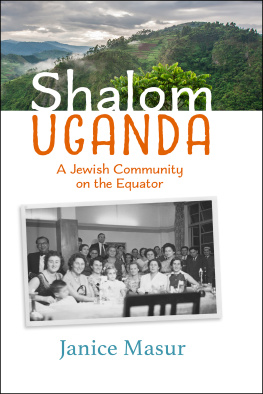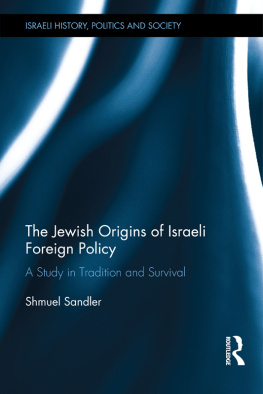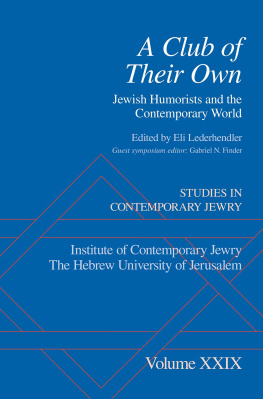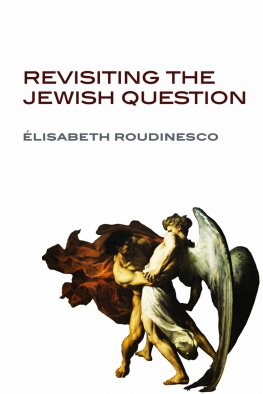KINSHIP & CONSENT
First published 1997 by Transaction Publishers
Published 2019 by Routledge
2 Park Square, Milton Park, Abingdon, Oxon OX14 4RN
52 Vanderbilt Avenue, New York, NY 10017
Routledge is an imprint of the Taylor & Francis Group, an informa business
Copyright 1997 by Taylor & Francis
All rights reserved. No part of this book may be reprinted or reproduced or utilised in any form or by any electronic, mechanical, or other means, now known or hereafter invented, including photocopying and recording, or in any information storage or retrieval system, without permission in writing from the publishers.
Notice:
Product or corporate names may be trademarks or registered trademarks, and are used only for identification and explanation without intent to infringe.
Library of Congress Catalog Number: 96-31952
Library of Congress Cataloging-in-Publication Data
Kinship and consent : the Jewish political tradition and its contemporary
uses / edited by Daniel J. Elazar2nd ed., rev. and enl.
p. cm.
Includes bibliographical references and index.
ISBN 1-56000-933-0 (pbk. alk. paper)
1. Judaism and politicsHistory of doctrines 2. Politics in rabbinical literature. 3. JewsPolitics and government. I. Elazar, Daniel Judah.
BM645.P64K56 1997
296.3877dc20
96-31952
CIP
ISBN 13: 978-1-56000-933-7 (pbk)
ISBN 13: 978-1-138-52675-4 (hbk)
This book is dedicated to Aileen Epstein Whitman and the late Gerson Epstein, two very good friends who helped us launch the first edition of this book and thereby inaugurate the field of Jewish Political Studies.
Contents
Daniel J. Elazar
Daniel J. Elazar
Stuart A. Cohen
Gordon M. Freeman
Bernard Susser and Eliezer Don-Yehiya
Daniel J. Elazar
Eliezer Schweid
Moshe Weinfeld
Daniel J. Elazar
Shlomo Dov Goitein
Menachem Elon
Gerald J. Blidstein
Peter Y. Medding
Ella Belfer
Dan V. Segre
Peter Y. Medding
Menachem Elon
Charles S. Liebman
David Hartman
Daniel J. Elazar
Guide
The publication of the first edition of this book was a landmark in the development of Jewish political studies as a field of inquiry. Prior to its appearance, courses in Jewish political studies had been taught at perhaps four universities around the world, two in the United States and two in Israel. With the appearance of the book came the development of other seminars and workshops in the field and within a decade courses in Jewish political studies were being taught at some twenty-five universities in North America, Europe, Israel, and in Australasia. The Kotler Institute held two additional summer seminars dealing with aspects of the field; then in 1980 the Jerusalem Center for Public Affairs established an annual summer workshop that has continued for sixteen years so far. The limited first edition of the book was rapidly sold and went into a second printing which now has also been sold out. The book came to be regularly used in courses on the subject.
In the meantime, research in the field has not only continued but has increased and has become more systematic as scholars have developed a theoretical framework for Jewish political studies, a terminology, and appropriate methodologies. While the original edition has stood the test of time very well, in great part because of the very high quality of the scholars who contributed to it, some of the gaps that then existed in the field have been filled. Hence, the time has come for a new edition. This edition contains five new chapters: The Concept of the Three Ketarim by Stuart A. Cohen, The Kehillah and The Jewish People as the Classic Diaspora by the present writer, The Jewish People and the Kingdom of Heaven by Ella Belfer, and The Application of Jewish Public Law in the State of Israel by Menachem Elon. Other essays have been revised and updated, particularly those by Menachem Elon and Peter Medding. Introductions are provided for each of the four parts, delineating the unifying historical and theoretical developments for each. We hope that the new edition will serve students and scholars in the field even better than the first and continue to provide a link between Jewish political studies and other fields of Jewish study.
This edition was prepared entirely by the Jerusalem Center for Public Affairs. It is part of the Milken Library of Jewish Public Affairs and special thanks for publication support are due the Foundations of the Milken Families. I would also like to express my appreciation to Mark Ami-El, the JCPAs very capable and efficient director of publications, and to Chaya Herskovic, the coordinator of the JCPAs projects in Jewish political studies whose assistance in all of our work related to this volume has been invaluable. Three of the additional chapters were produced for the Workshop on Covenant and the Jewish Political Tradition jointly conducted by the Senator N. M. Paterson Chair of the Department of Political Studies at Bar-Ilan University and the Center for Jewish Community Studies of the JCPA. Meir Kasirer has coordinated the workshop since its beginning. Many thanks are due him as well as to all the participants in the workshop and Bar-Ilan University itself.
Daniel J. Elazar
Jerusalem
Ellul 5756, August 1996
The Jews of Israel and the Jewish people as a whole are presently in the process of searching for a usable past. A major part of that search involves the rediscovery of the Jewish political tradition and its application to contemporary conditions in Israel and the diaspora.
The 1975 summer Colloquium of the Institute for Judaism and Contemporary Thought, at Kibbutz Lavi, was devoted to the exploration of Jewish political life and thought from the biblical period to the present in order to ascertain the content and character of the Jewish political tradition and its relevance for our time. The colloquium was organized on the assumption that there is a Jewish political tradition and that it is one worth relating to. Like all of Jewish tradition, its roots are in the Bible, which has provided Jews and the rest of mankind with an important political teaching, principally through the covenant idea and its implications. As a tradition, it is best expressed through the political institutions and behavior of Jewish communities throughout the generations. There are important works in Jewish political thought but, in the manner of Jewish thought, they are essentially commentaries on the reality of Jewish life.
By bringing together scholars and participants in public affairs from Israel and the diasporaincluding political and social scientists, Talmudists, historians, philosophers, and students of the Biblethe colloquium brought to bear a wide range of perspectives on the consideration of the various manifestations of the Jewish political tradition today and in the past, such as the relationship between authority and power, patterns of political organization and leadership, the Jewish language of politics, Israel as a Jewish polity and the Jewish views of the ideal polity.
This volume is an outgrowth of the Lavi meeting. It presents the finest fruits of that meeting to a larger public, offering an initial statement regarding the character and content of the Jewish political tradition from the biblical period to the present and suggestions as to the contemporary meaning and manifestations of that tradition. As such, we hope that the book will be an important contribution to contemporary Jewish scholarship and public affairs, one that will stimulate additional scholarly work in the emerging field of Jewish political studies and which will focus public attention on the character, meaning, and importance of the Jewish political tradition for contemporary Jews wherever they may be.










